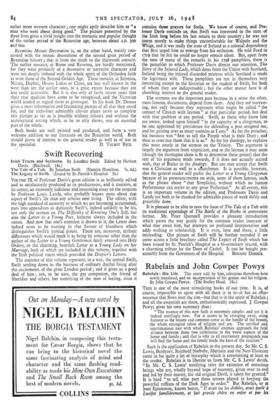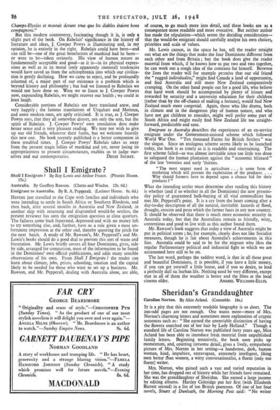Rabelais and John Cowper Powys
Rabelais : His Life. The 'story told by him, selections therefrom here newly translated, and an interpretation of his genius and his religion. By John Cowper Powys. (The Bodley Head. 15s.) THIS is one of the most stimulating books of our time. It is, of course, impossible to agree with all there is in it—it has an effer- vescence that flows over the rim—but that is in the spirit of Rabelais ; and all the essentials are there, enthusiastically expressed. J. Cowper Powys gives his own summary thus : "The essence of this new faith is extremely simple: and yet it is indeed startlingly new. For it seems to be sweeping away, using humour as the broom and common-sense as the handle of the broom, the whole entangled taboo of religion and sex. The terrified and sanctimonious awe with which Rabelais' enemies approach the fatal alliance between those two culminates in the worst aspects of the home and family ; and that is why in all reactionary propaganda you will find the home and the family made the knot of the reaction.'
Such is the application of Rabelais to the present day. So Mr. C. S. Lewis, Berdyaev, Reinhold Niebuhr, Maritain and the Neo-Thomists come in for quite a lot of horseplay which is entertaining at least to the reader. Rabelais is to liberate us from Mr. C. S. Lewis' devils. "In Mr. C. S. Lewis' terrifying tales the existence of conscious beings who are, wholly beyond hope of recovery, given over to evil and led by their master, the old original Devil, is taken for granted." It is hard "to tell what part these terrors played in keeping the powerful ruffians of the Dark Ages in order." But Rabelais, or at least Epistemon, knows better, "Ii avait vu les diables, avait Petrie a Lucifer familierement, et fait grande chere en enter et par lea
Champs-Elysies et assurait devant taus que les diables etaient bons compagnons."
But this modern controversy, fascinating though it is, is only a slight part of the book. On Rabelais' significance in the history of literature and ideas, J. Cowper Powys is illuminating and, in my opinion, he is entirely in the right. Rabelais could have been—and can still be—one of the great benefactors of mankind had he been— or were to be—taken seriously. His view of human nature as fundamentally acceptable and good—as it is—in its physical expres- sions as well as in its moral (only apparently immoral) tendencies would have saved us from the schizophrenia into which our civilisa- tion is gently declining. How we came to reject, and be profoundly ashamed of, a major part of our existence is a problem which is beyond history and philosophy ; but had we listened to Rabelais we would not have done so. Were we to listen to J. Cowper Powys now, expounding Rabelais, we might recover our health ; we could at least laugh.
Considerable portions of Rabelais are here translated anew, and very happily ; the famous translations of Urquhart and Motteux, and some modern ones, are aptly criticised. It is true, as J. Cowper Powys says, that they all somewhat distort, not only the text, but the spirit of Rabelais. J. Cowper Powys' own translation does make better sense and is very "pleasant reading. We may not wish to give up our old friends, whatever their faults, but we welcome heartily this new one. No book recently published is a better companion in these troubled times. J. Cowper Powys' Rabelais takes us away from the present tragic follies of mankind and yet, never losing its appropriateness to present circumstances, enables us to judge our-



































 Previous page
Previous page